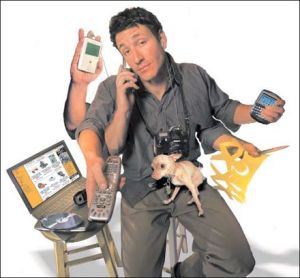My cat Pitty, now gone to feline heaven after eighteen years of choosing to live with my family, loved her catnip. The moment I entered the house with a sprig freshly cut from the garden, she would be all over me, mewing and rubbing against my legs until I gave in to her pleas. Pitty would first rub her face in the irresistible herb and then roll around on the floor, infusing her fur with the hypnotic aroma of catnip. Now, to me, catnip stinks, but to Pitty, it was pure heaven. She couldn’t get enough of it. As she fell deeper into her catnip induced stupor, her pupils would become huge and her pleasure became obvious. If you dared to touch her or her beloved catnip during her delirium, you would bear the scarlet reminders of your foolishness for a few days. Better to just let her finish her revelry and walk away before you picked up the limp and well-crushed sprig and placed it in the compost heap.
After reading a previous blog post, Developing Better Habits, a colleague suggested I read Hooked on Gadgets, and Paying a Mental Price in the New York Times. My Pitty and her catnip habit came to mind as I read the article. Matt Richtel’s article introduces the reader to the Campbells, a family of four: mom, dad, 16-year-old son Connor, and second grader Lily, all firmly attached to their electronic gadgets and suffering difficulties because of their addiction.
Mom burns not one but two batches of cookies intended for Teacher Appreciation Day because she’s interrupted by a text message after putting the cookies in the oven. That leads to a long stay on Facebook. Result: she has to buy cookies from the store. Being constantly bombarded by two computer screens filled with e-mail, instant messages, online chats, the Web browser, and the computer code he writes, Dad had somehow missed the most important email of his life offering to buy his internet startup for $1.3 million dollars. Result: when he did notice it two weeks later, he had to apologize to the buyer; he did, however, make the deal.
The kids are just as distracted by gadgetry. Connor made his first “C’s” in school last year. His mother blames it on his lack of focus on his homework. She might have something there. Like his dad, he has two monitors on his desk, one for his music and one for keeping up on Facebook and Reddit, a social site with news links. He uses his iPhone to text his girlfriend frequently. And he and his Dad love to play video games on the large, flat screen TV. Lily, the second grader, is also hooked on her gadgets: an iPod Touch, a portable DVD player, and her very own laptop on which she watches videos, listens to her music and plays games. Though she is limited to one hour a day of unstructured time, Lily usually spends that time with her gadgets. Her mom claims she is so engrossed when she is on her laptop that she doesn’t hear her mother calling her.
The Campbells are the norm rather than the exception in today’s world. Researchers at the University of California, San Diego, report that in an average day, people use media twelve hours a day, pointing out that watching TV while using the laptop at the same time is counted as two hours of use. In 1960 that figure was a mere five hours a day. The multitasking that has resulted from this explosion of technology and media has led to many studies about how this affects the brain and if the brain can, indeed, be productive if we are constantly switching from one task to another.
Stanford has done quite a few studies on how multitasking affects the brain. Researchers at Standford claim that multitaskers appear to be more sensitive to incoming, or new, information than non-multitaskers. The results of their studies “illustrate an age-old conflict in the brain, one that technology may be intensifying. “ Part of the brain acts like a control tower, “helping the person focus and set priorities.” In other words, deciding what we need to pay attention to and what we need to do now or can put off until later. The more primitive parts of the brain, processors of sight and sound, bombard the control tower, demanding that it pay attention to new information it sees and/or hears. The evolutionary purpose of these lower-brain functions of sight and sound is to alert humans to nearby dangers: The roar of the approaching lion will override my goal of building the hut. In my modern brain’s control tower, the sound of incoming e-mail or a text message will override my goal of writing this blog.
Clifford Nass, a communications professor at Stanford, puts it in simpler terms: “Throughout evolutionary history, a big surprise would get everyone’s brain thinking. But we’ve got a large and growing group of people who think the slightest hint [my emphasis] that something interesting might be going on is like catnip. They can’t ignore it.” Nass claims Stanford’s studies reveal the lingering effects of multitasking. People like Daddy Campbell can’t shut off their multitasking tendencies even when they’re not multitasking. This is confirmed by Richtel’s description of the Campbells’ inability to quit their gadgets when on vacation.
There are some positive things to report about multitasking. Preliminary research at the U. of Utah has shown some people are “supertaskers” who can easily juggle multiple information streams. The downside is that “supertaskers” comprise less than 3% of the population. Imaging studies have shown that Internet users have greater brain activity than non-users, suggesting the growth of their neural circuitry, good news for all of us worried about Alzheimer’s—note to self: play more computer games. And playing games can improve reaction and the ability to distinguish details among clutter.
Bottom line: Is the influence of technology on our brains good or bad? And how significant is it? Steven Yantis, professor of brain sciences at Johns Hopkins U. says, “….the brain is wired to adapt.” He adds that it is undeniable that brain rewiring is going on all the time, but in typical “researcher-speak” he says it’s “too early to say whether the changes caused by technology were materially different from others in the past.” Interpretation: more studies need to be conducted.
Let me tell you what I see as the effect of technology and these exploding numbers of gadgets we can’t leave alone. It’s turned us all into cats. If I opened a drawer or a door, Pitty could not resist; she had to see what was in that drawer, no matter what the consequences were. My sister’s cat was legendary for his inability to resist an open door. He lost one of his nine lives due to his curiosity: once slipping unnoticed into the clothes dryer and taking a quick spin with the clothes, resulting in heat stroke and near death experience, AND slipping into the refrigerator when someone opened the door, spending who knows how long in the cold until someone came along and opened the door. Unfortunately, he was unable to reveal if the light stays on when the door to the fridge is closed.
Like cats, we can’t leave our technology alone. We can’t turn it off. If it pings, we answer. Even if the professor has banned cell phones from the class, do you have it on vibrate? If it vibrates, do you secretively slip it from your pocket or purse to see who’s calling? Have you ever sent a text message in response—even if it’s only ten minutes before class is over? I could give you many examples like this one, but I’m assuming you get the point. Like my cat Pitty, we can’t leave a phone unanswered, an email unread, an IM unanswered, a status unstated on Facebook, even if we have a huge biology test, a paper in ENG 102, and a quiz in government due tomorrow.
 Technology is human catnip–can’t leave it alone, can’t live without it, don’t bother me when I’m on it. How does it affect the human brain? It makes us unfocused [except when we’re on our human catnip]. It sabotages our relationships. The previous two create stress in our lives. I’m not telling you what to do; I learned from Pitty not to take away a cat’s drug, but I would advise you to remember that curiosity killed a cat.
Technology is human catnip–can’t leave it alone, can’t live without it, don’t bother me when I’m on it. How does it affect the human brain? It makes us unfocused [except when we’re on our human catnip]. It sabotages our relationships. The previous two create stress in our lives. I’m not telling you what to do; I learned from Pitty not to take away a cat’s drug, but I would advise you to remember that curiosity killed a cat.



Isn’t ironic that this article telling us not to become dependent on technology is on the internet? ….?!?